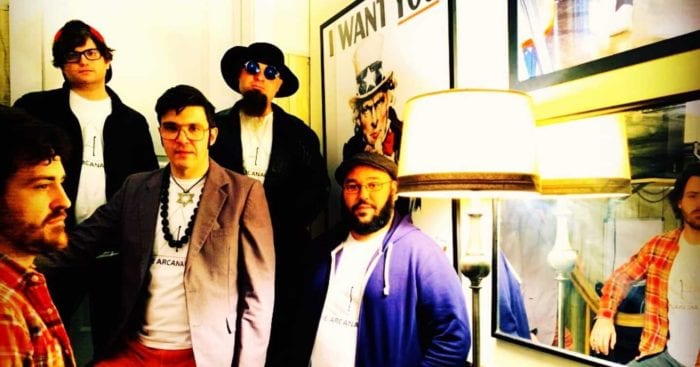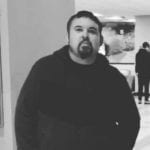
“There’s a history of music being made that way going back to the mid-’70s.”
Inventive music has an interesting effect on the senses. It can excite, it can question, it can confuse, and it can energize. Sounds can stand on their own and offer something different to the artistic equation, and can also provide a fun and entertaining listening experience.
Boston jazz-funk act the Arcanauts have done all of this with their latest release, The Hermit EP. The quintet of guitarist Tom Dowd, woodwinist Joe Albano, keyboardist Evan Waarmaa, bassist Greg Toro, and drummer, percussionist, and synth player David Moore combine their talents to make groovy sounds that push boundaries.
Moore and I recently spoke about making the EP remotely, his job as a librarian, and loving to collaborate.
Before The Hermit EP came out on Jan 21, it was only a few months earlier that the Arcanauts put out their debut release, Initiation. What did you aim to do with this new release that you didn’t get to do while making your first record?
We made the first album with the intention of booking shows regionally, and all of the musicians that are in the Arcanauts for the most part are highly competent multi-stylists and multi-instrumentalists. We’ve all worked with a lot of different artists from a lot of different genres and for me personally, the Arcanauts is kind of my declaration of doing something for myself, sharing my vision and pushing it forward. I have great admiration for the rest of my bandmates as musicians, but also as people.
We had booked several shows regionally, and of course with the pandemic all of that fell apart. From an artistic standpoint, we all kept thriving, and I was learning skills to record and produce from home to fit the new paradigm of our time. This gave us the opportunity to continue working musically to develop new material in a way that’s unorthodox for jazz music and improvised music. It was also a huge learning and artistic opportunity along with me making the best of what we had to work with.
You’re a jack of all trades on the record, handling songwriting, production, drumming, percussion, synthesizers, and even rapping on the track “The Magic (Is You).” Did you do anything in particular to keep from being creatively burnt out?
We didn’t compose this record out of traditional recording sessions, so everything we did was done by sending each other files back and forth. What would usually happen is that I would write the tune, followed by a fleshed-out score. Then, I would do a demo version of that with really terrible MIDI sounds, and after I sent it to the other guys I would track all of the drums and percussion I was planning on using. Then, I would do a round of overdubs, so none of us were actually in the same room at the same time while making this record. We were all working remotely.
There’s a history of music being made that way going back to the mid-’70s. You had mavericks like Ray Parker Jr. and Prince making records that way and people thought they were crazy. There’s all these stories of Prince flying mastertapes around the country to Lisa Coleman, Wendy Melvoin, and the rest of the Revolution. Nowadays, it’s not only multimillion-selling artists that can do this, but it’s rare to do with music that’s improvisation oriented. I would say that I didn’t ever burn out on the creative force because I was always excited to hear what the other guys were bringing to the music.
When I got their recordings back, it would just excite me more and I didn’t know what they were planning on doing beforehand. For example, in the title track introduction that Tom [Dowd] put together, I had no expectations of what he was going to do. I told him to give me something for an intro, and what he did just blew me away, it took the whole piece to another level. Another example would be on the tune “TRATAKAFUNK!” I wrote the melody, I wrote the groove, and I wrote the basic form, but I told Joe [Albano] to come up with some kind of sax solo and he orchestrated that whole thing on the melody.
The input the other guys had on the EP motivated me to up my game and to take what I was doing more seriously. I love working with collaborators for that reason, it’s having someone else to bounce your ideas off of.
I love the end result of collaborations, oftentimes it can be extraordinary. Speaking of collaboration and the track “The Magic (Is You),” the band got to have legendary session guitarist Wali Ali, who has played with the likes of Marvin Gaye and Aretha Franklin, vocalist Robbie Pate, and violinist Chris Tedesco involved in the making of it. How did this happen? Did they approach you or did you reach out to them individually?
I reached out to each of them individually, and the relationship with each of those men is very different. Chris is someone I’ve been working with off and on for well over a decade. I lived in New York City for about eight years, even though I’m a Massachusetts native I chased the New York dream so to speak for a minute. I met Chris during that time and I’ve always been impressed with his professionalism, his musicianship, the way he looks at music, and the way he’s able to execute things in both a raw and highly professional fashion. I knew he was the right guy to add the strings to this and there aren’t a lot of people who can do what he did.
You hear that part and it sounds like a full studio string orchestra, but it’s just one guy who knows how to record himself well and play well. It’s a big accomplishment, and it shows what he’s capable of. Robbie is a guy who I’ve played a lot with locally in the Boston area, he’s a fantastic singer and I knew he was the right guy for the track. He comes from a jazz background but his knowledge of older r&b, dance, and funk styles is very deep, so I knew that he would know what to do with the material. I also like working with the guy.
I had known Wali was living around Boston, and I’d seen him play one time. I didn’t get the chance to talk to him that night, but I was really impressed with his body of session and recording work. He’s an unsung hero of the electric guitar and the thing about it is that I love great rhythm-guitar players, which is sometimes an overlooked aspect of that instrument. He brings something to that which is really, really special, and I think he brought that to the song. He compares it to some of the work he’s done with Rick James, which floors me.
Rick James is somebody who hasn’t been given the credit he is due. He’s a pivotal figure in funk music from the late ‘70s and Wali is on all of his records. It was really great to get all of those guys involved, for sure.
You’re also a librarian at the Salem Public Library, right?
That’s correct.
You live a life where as a musician you’re encouraged to be loud, but in a library you’re encouraged to be quiet. How do you handle that dichotomy and do you consider yourself to be a bookworm? Do you do a lot of reading?
I find that the two disciplines are complementary in a lot of ways. The thing about libraries being quiet, it’s a trope from another era. Most libraries are generally quiet environments, but it’s certainly not the old trope of a shushing librarian. I love literature, I love books, and I love media of all sorts, so being able to create it as an artist myself and being able to catalog and organize it to share that with people as a librarian is also really a cool thing.
That is really cool. What’s next for the Arcanauts? Can we expect another release later on in the year to keep up the band’s prolific output? Will you be doing any virtual shows?
This time has provided us with an opportunity which at first didn’t appear that way, but it made it imperative that artists and producers of media of all sorts figure out new ways to connect with audiences and share their work. The Arcanauts project is a specific flavor that only happens when those minds come together to be a part of it, and I feel privileged that the other guys in the band are willing to work with me.
We’re currently planning another recording project while featuring more of the writing of the other members of the ensemble, so we’re in the primary phases of that. I’m also working with several other artists as a producer now after having developed the skills on the EP and other recordings I have done with folks during the pandemic. I’m enjoying that role of collaborating with people who are either singer-songwriters, electronic artists, or rappers, and acting as the producer. The vehicle of the Arcanauts is definitely growing and expanding with new people all the time while embracing what the music is about.
Rob Duguay is an arts & entertainment journalist based in Providence, RI who is originally from Shelton, CT. Outside of DigBoston, he also writes for The Providence Journal, The Connecticut Examiner, The Newport Daily News, Worcester Magazine, New Noise Magazine, Northern Transmissions and numerous other publications. While covering mostly music, he has also written about film, TV, comedy, theatre, visual art, food, drink, sports and cannabis.

